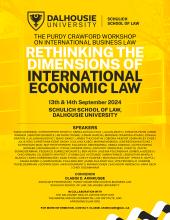Symposium: Assessing the First Years of Implementation of the AFCFTA: Challenges and Opportunities — A Critical Analysis of Dispute Resolution under the African Continental Free Trade Area (AfCFTA) Regime
Dispute settlement is a central tenet of any economic block as it provides the necessary security and predictability for the state parties. The Architecture of the AfCFTA is reflective of these principles as the AfCFTA Agreement has introduced a rules-based dispute settlement regime which mirrors the WTO’s Dispute Settlement Understanding. The success of the AfCFTA is highly dependent on the effectiveness of the dispute settlement mechanism. In considering the Dispute Settlement Mechanism (DSM) of the AfCFTA this piece highlights the salient features of the DSM and explores some of the challenges that should be anticipated. This piece fronts the argument that the AfCFTA should have diverged from the traditional dispute settlement mechanisms adopted by the WTO. Further, it attempts to answer the question on whether African States will utilize the DSM given the current status quo of the dismal use of the WTO’s DSM.
